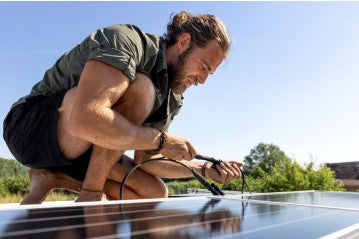
In recent years, the increasing demand for alternative power sources has led to the rise in popularity of solar energy solutions. Among the options available, solar generators and inverters have gained significant attention. If you're considering investing in solar energy products, it's crucial to understand the differences between these two options. In this blog post, we will explore the distinctions between solar generators and inverters, helping you make an informed decision.
Solar Generators: Harnessing the Power of the Sun
Solar generators are innovative devices that harness the power of the sun to generate electricity. They work by capturing sunlight through solar panels, which then converts it into usable energy. This energy is stored in a built-in battery or power bank for later use. The benefits of solar generators are plentiful. Firstly, they offer a renewable and eco-friendly energy source, reducing your carbon footprint. Additionally, solar generators provide independence from the electrical grid, ensuring uninterrupted power supply even during outages. Their portability and versatility make them ideal for outdoor activities like camping or emergency situations where conventional power sources are unavailable.
However, it's important to consider some potential drawbacks. Solar generators have limited power output and storage capacity, dependent on the size of the solar panels and battery capacity. Moreover, their operation is contingent upon sunlight availability, which means they may not be as effective in low-light or cloudy conditions. Nevertheless, solar generators are a reliable and eco-conscious option for those seeking portable solar energy solutions.
Inverters: Transforming DC Power to AC Power
Inverters play a vital role in converting direct current (DC) to alternating current (AC), which is necessary for powering most household appliances. They can be used in conjunction with battery systems or solar panels to provide a continuous flow of electricity. The advantages of inverters are worth noting. They have the capacity to power various household appliances, making them a versatile choice for residential applications. In addition, inverters seamlessly integrate with existing electrical systems, allowing you to use solar energy alongside the conventional power grid. Some inverters even offer the option to feed excess power back into the electrical grid, potentially reducing energy costs.
However, there are a few limitations to consider. Inverters rely on an external power source, such as batteries or solar panels, to function properly. This means that they cannot generate electricity independently. Additionally, while inverters provide reliable power, they lack the portability of solar generators and are typically stationary, making them more suitable for fixed installations.
Key Differences between Solar Generators and Inverters
To better understand the distinctions between solar generators and inverters, let's compare them across several key factors:
1. Power Generation: Solar generators directly convert sunlight into electricity, whereas inverters convert stored or supplied DC power into AC power for everyday use.
2. Energy Storage: Solar generators feature built-in batteries or power banks to store electricity, while inverters depend on external power sources like batteries or solar panels.
3. Power Output: Solar generators have limited output capacity based on the size of the solar panels and battery capacity, while inverters can support higher power demands based on the connected power sources.
4. Portability and Versatility: Solar generators are portable and versatile, making them ideal for outdoor activities and emergencies. In contrast, inverters are typically stationary and integrated into existing electrical systems.
5. Dependence on External Factors: Solar generators rely on sunlight availability for power generation, whereas inverters rely on a constant power source, such as batteries or solar panels.
Conclusion
When considering solar energy solutions, it's crucial to understand the differences between solar generators and inverters. Solar generators harness the power of the sun, providing renewable energy and independence from the electrical grid, albeit with some limitations in power output and dependence on sunlight. Inverters, on the other hand, transform DC power to AC power, integrating with existing electrical systems and offering the ability to power various household appliances. However, they require an external power source and lack the portability of solar generators.
By understanding these distinctions, you can make an informed decision that aligns with your specific needs and requirements. Whether you opt for a solar generator or an inverter, it's advisable to seek professional advice and explore reputable brands in the market. Embrace the power of solar energy and take a step toward a more sustainable future.

0 Kommentare